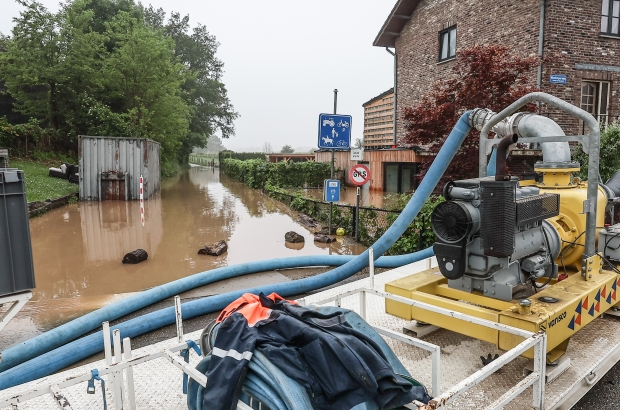- Daily & Weekly newsletters
- Buy & download The Bulletin
- Comment on our articles
Flooding in parts of Liège and Limburg province 'worst since 2021'
Parts of Limburg and Liège provinces saw intense flooding over the rainy weekend, which one journalist on the scene described as “the worst floods in the area since 2021.”
Wallonia saw the bulk of the flooding in Belgium, with multiple mayors and local authorities similarly reporting that it was the worst of its kind in many towns’ histories.
The communes of Dalhem, Liège, Soumagne, Trooz and Beyne-Heusay were also among the hardest hit, with the governor describing a “very difficult” situation in Dalhem and Trooz during the night.
In both these areas, people were trapped in their homes and had to be evacuated. A nursing home was partially evacuated at Chênée.
There were at least 550 requests for assistance in Liège, major motorways closed in both directions, multiple power outages and again homes had to be evacuated. No casualties have been reported so far.
Extreme flooding also hit the commune of Voeren (Les Fourons) in Limburg province near the Dutch border.
“We are facing the worst flooding in the town's history,” the municipality said in a social media post at the time.
“For some residents, the water in their homes was up to their chests, which was a terrible thing to experience,” said Voeren mayor Joris Gaens. In about 100 homes, the water was said to have reached one metre deep.
With the waters having largely receded in most places, the fire brigade and other emergency response teams are busy clearing debris and pumping out remaining water.
Flooding was similarly bad in parts of France near the Belgian border, with the French weather service explaining that heavy rainfall starting on Thursday night caused “a rapid rise” in river levels. The north-east of the country was placed under red alert for exceptional flooding over the weekend.
Flemish minister-president Jan Jambon and environment minister Zuhal Demir announced on Saturday that Flanders will likely recognise the weekend’s severe floods as a natural disaster in the Flemish municipalities that were affected, which will help ensure funding for repairs.
“With more than 70mm of rainfall in just a few hours, this is a dramatic and unprecedented event,” Voeren mayor Joris Gaens said on social media.
“This is a tragedy for many people and a great challenge for the local authorities and security services. I would like to thank them from the bottom of my heart for their efforts.”
Victims of the flood are struggling to cope with such immense damage so soon after 2021’s fatal floods.
“Since 2018, this is the third time it's happened and each time it gets worse and worse,” one victim told RTL.
“Last year, the water level was 50cm. Here, there was a total of 58cm, so there's more and more water every time. It was complicated to rescue anything. We tried to save as much as we could, but it's impossible to save everything.”
Insurance companies are also scrambling to mobilise their teams, setting up satellite offices in the disaster-stricken areas.
According to insurer Ethias' disaster assistance team, it is still too early to make an initial assessment of damages and so its main priority is to provide practical assistance to policyholders.
“At this stage, we have mobilised our service providers to intervene quickly, particularly in the efficient evacuation of badly damaged vehicles,” the company said.
“Our partner hotels have also been alerted so that we can rehouse our policyholders if necessary. And our local authority inspectors are in contact with the authorities in the municipalities affected to assist them with the necessary procedures.”
All policyholders who suffered damage are invited to report it via their customer portal or the Ethias website, where they can also find advice on how best to manage such a claim.
The insurer has also deployed its mobile office in the province of Liège, enabling it to provide immediate and appropriate assistance to those most affected or who do not have or no longer have access to the internet.
Photo: Bruno Fahy/Belga



















